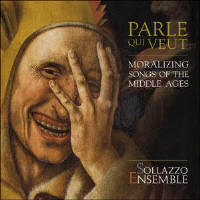Texte paru dans: / Appeared in: |
|
| Strongly recommended |
Outil de traduction ~ (Très approximatif) |
|
Reviewer: Barry
Brenesal
When I requested this album
for review, I assumed its 14th-century selections, both Italian and French,
would pursue a close trajectory around Cicero’s famous “O tempora, o mores.”
In other words, it would emphasize texts that railed at the morals of the
day, in comparison to those of the past. But the liner notes play fast and
loose with the word “moralizing,” so that it means anything from decrying
the current state of music in Landini’s Musicha son, to moaning about
personal bad luck in the anonymous Va, Fortune, to Zacara’s caccia,
Cacciando per gustar, a “cries of the marketplace” piece set in
Rome—identical in structure (save for a satirical introduction) to
Janequin’s Les cris de Paris and Gibbons’s delightfully crude The Cries of
London. Of the three pieces mentioned on this album, only the Landini
qualifies as a moralizing song.
Set aside the program,
however, as well as references to the Squarcialupi Codex (since a number of
selections on this album aren’t drawn from it), and we end up with an
attractively varied group of selections that display this vocal ensemble’s
talents well. Quite a few can be found on other discs—which isn’t
necessarily a bad thing, as it can help illustrate the textural and
expressive diversity possible in these works, given how thoroughly
performers were expected to contribute to the creation of each composition.
So the Orlando Consort, on its album Food, Wine and Song (Harmonia Mundi
907314), downplay Cacciando per gustar’s tongue-in-cheek, mock-serious
opening pages, while the Sollazzo Ensemble take the passage more slowly and
give its vocals an air of pretentious solemnity. This kind of expressive “face” is not typical of vocal ensembles in early music, but it often proves the case, here. Strong accenting and sharply curtailed phrase endings cleverly provide the musical equivalent of spitting anger in Andrea da Firenze’s Dal traditor. The keening melismatic phrases of Va, Fortune, are broken by a breathy, half-exploded “Da mort, m’atent, las!” (Death is waiting for me, alas!) Given how reticently most of this music is usually sung, I find an attempt to give it greater expression welcome, even if very occasionally the group’s singers go overboard—as in a couple of sharply nasal moments in Solage’s Le basile, rendered opaque by the tenor’s poor enunciation. Poor enunciation isn’t a problem in most of the sung selections here, and the two sopranos boast both attractively bright tone and excellent agility, from which both Dal traditor and O pensieri vani benefit. Sollazzo Ensemble features three singers and three instrumentalists, the latter playing harp and vielles. Two non-vocal selections are included, in which they give a good accounting of themselves, with stylishly ornamented divisions in Hont paur and Ciconia’s popular Ligiadra donna. The sound is close and well balanced, allowing singers and instrumentalists to make as vibrant an effect as the ensemble clearly aims to achieve. My only serious complaint is this release’s truly poor timings. At 13 cuts totally 46:01, it would have been considered average back in the LP era; but with CDs averaging between 60 and 80 minutes today, this really detracts from its value. That noted, this is a fine antidote to albums that are performed without any attempt to dramatically shape the line without musically upsetting it. Strongly recommended. | |
|
|
|
|
Cliquez l'un ou l'autre
bouton pour découvrir bien d'autres critiques de CD |
|




